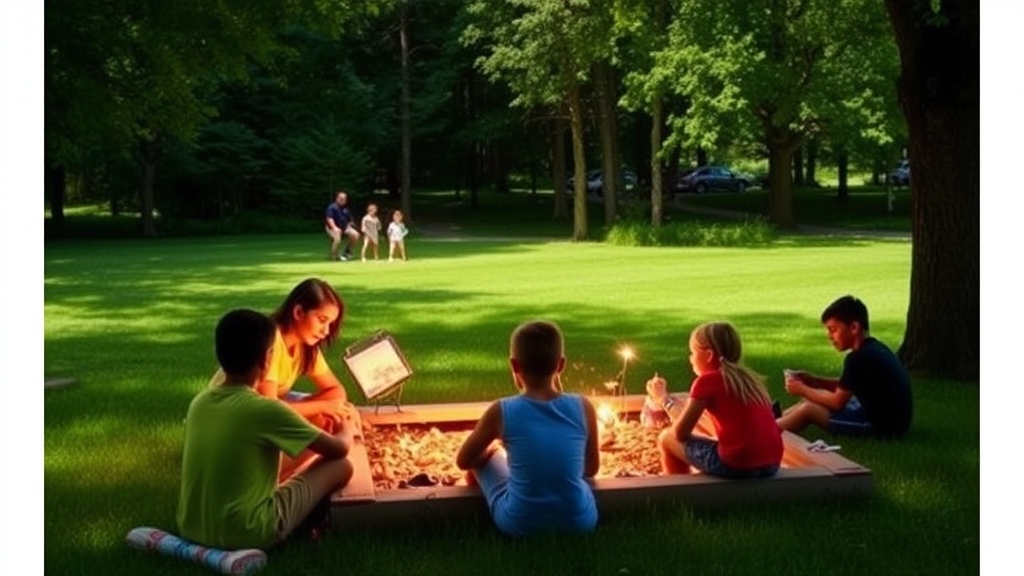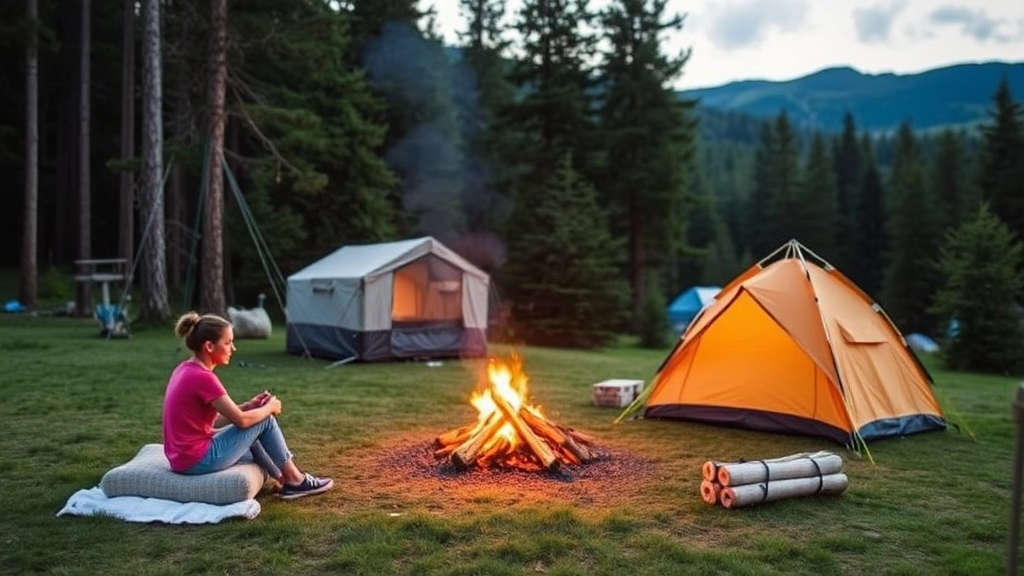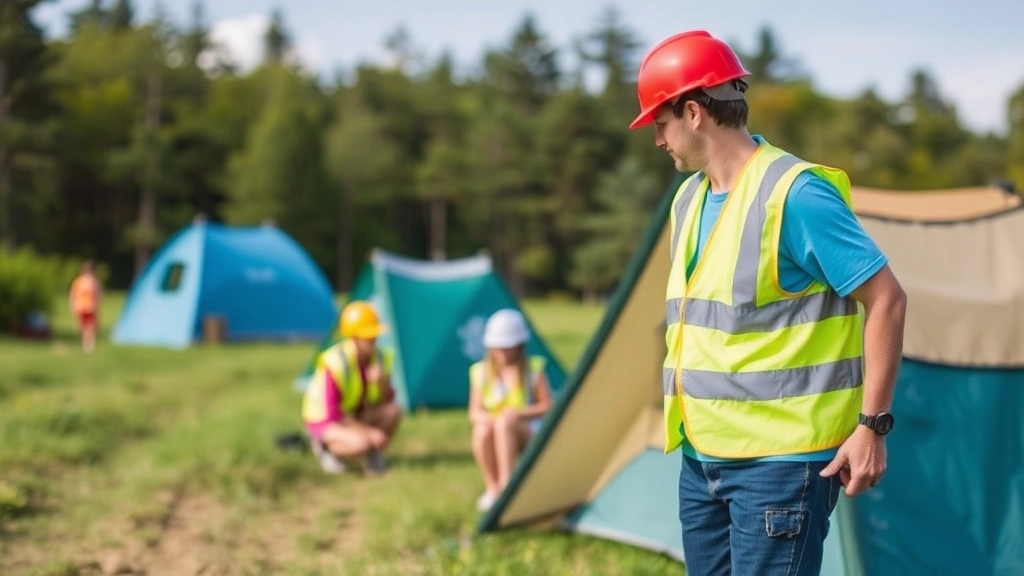Considering a Summer Camp for Your Teen?
Are you considering a summer camp for your teen but feeling overwhelmed by the options and details? You’re not alone. In this article, we’ll explore the diverse types of summer camps for teens, from traditional to specialized, and the benefits these experiences offer. We’ll also delve into popular activities, tips for choosing the right camp, and how to prepare your teen for their adventure. Safety, budgeting, and real-life success stories will be covered to ensure you make an informed decision.
The Benefits of Summer Camps
Summer camps are more than just a way to keep teens occupied during the break. They offer invaluable opportunities for personal growth, skill development, and social interaction. From boosting confidence and independence to fostering lifelong friendships, the benefits are endless. Whether your teen is into sports, arts, or science, there’s a camp out there that can cater to their interests and help them thrive.
Embark on the Journey
So, let’s embark on this journey together and find the perfect summer camp experience for your teen!
Types of Summer Camps for Teens
Alright, let’s dive into the different types of summer camps for teens. This is a big decision, and I get itâthere are loads of options out there, and it can be overwhelming. But don’t worry, I’ve got your back. Let’s break it down and make it easy to choose the right camp for your teen.
Traditional Summer Camps
When you think of summer camps, this is probably what comes to mind. Traditional summer camps offer a mix of activities like swimming, hiking, arts and crafts, and sports. It’s a great way for teens to unplug, make new friends, and enjoy the great outdoors.
Pros:
- Variety of activities
- Balanced mix of fun and learning
- Opportunity to make lifelong friends
Cons:
- Might not cater to specific interests
- Can be pricey
Specialised Camps
These camps focus on specific interests or skills. If your teen is passionate about something, there’s probably a camp for it. Here are a few examples:
Sports Camps
- Football, basketball, swimming, you name it.
- Great for teens looking to improve their skills and stay active.
Arts Camps
- Music, theatre, painting, and more.
- Perfect for creative teens wanting to hone their artistic talents.
Academic Camps
- Science, maths, coding, etc.
- Ideal for teens looking to get ahead in school or explore potential careers.
Pros:
- Focused learning and improvement
- Meet like-minded peers
- Often led by experts in the field
Cons:
- Less variety in activities
- Can be intense
Adventure Camps
For the thrill-seekers, adventure camps offer activities like rock climbing, white-water rafting, and zip-lining. These camps are all about pushing boundaries and embracing the adrenaline rush.
Pros:
- Exciting and unique experiences
- Builds confidence and resilience
- Encourages teamwork
Cons:
- Can be physically demanding
- Safety concerns for some parents
Leadership Camps
Leadership camps are designed to develop teens’ leadership skills through activities, workshops, and team-building exercises. These camps focus on personal growth and preparing teens for future challenges.
Pros:
- Enhances leadership and communication skills
- Builds self-confidence
- Looks great on college applications
Cons:
- May feel too structured for some teens
- Can be expensive
Special Needs Camps
These camps cater to teens with physical, developmental, or emotional needs. Special needs camps offer a supportive environment with tailored activities and trained staff.
Pros:
- Inclusive and supportive
- Tailored to individual needs
- Builds confidence and social skills
Cons:
- Limited availability
- Can be costly
Day Camps vs. Overnight Camps
Another thing to consider is whether to go for a day camp or an overnight camp. Day camps are perfect if your teen isn’t ready to stay away from home, while overnight camps offer a more immersive experience.
Benefits of Attending Summer Camps

Ever wondered why summer camps are a big deal for teens?
Let’s break it down.
Summer camps aren’t just a way to keep teens busy. They’re packed with benefits that can shape their future.
Boosts Confidence and Independence
First off, summer camps help teens gain confidence and independence.
Away from home, they get to make decisions on their own.
It’s like a mini boot camp for real life.
Builds Social Skills
Then there’s the social aspect.
Teens meet peers from different backgrounds.
They learn to communicate, collaborate, and even resolve conflicts.
It’s like social skills on steroids.
Teaches New Skills
Camps offer a range of activities.
From sports to arts, there’s something for everyone.
Teens can discover new interests and talents.
It’s a great way to step out of their comfort zone.
Promotes Physical Activity
In today’s digital age, getting teens off their screens is a win.
Camps promote physical activity.
Whether it’s hiking, swimming, or playing sports, they’re moving and grooving.
Encourages Resilience
Life isn’t always smooth sailing.
Camps teach resilience.
Teens face challenges and learn to overcome them.
It’s a safe space to fail and try again.
Fosters Lifelong Friendships
Remember those campfire stories?
They’re more than just fun.
They help build lifelong friendships.
Shared experiences create strong bonds.
Improves Mental Health
Nature and fresh air do wonders for mental health.
Camps offer a break from the hustle and bustle.
It’s a chance to relax and recharge.
Enhances Academic Performance
Believe it or not, camps can boost academic performance too.
How?
By developing skills like problem-solving, critical thinking, and creativity.
These skills translate well into the classroom.
So, why should teens attend summer camps?
Because the benefits are endless.
Popular Activities at Teen Camps
Alright, let’s get real. What are the popular activities at teen camps that make them worth the hype? Whether you’re a parent wondering if your kid will have a blast or a teen curious about what you’ll actually be doing, I’ve got you covered.
Why Are Activities So Important?
First off, activities are the backbone of any summer camp. They keep teens engaged, help them learn new skills, and most importantly, make the camp experience unforgettable. But what exactly can you expect? Let’s break it down.
Outdoor Adventures
Hiking and Nature Walks
Imagine trekking through lush forests, discovering hidden trails, and learning about local flora and fauna. It’s not just a walk in the park; it’s an adventure that boosts both physical fitness and mental well-being.
Water Sports
From kayaking and canoeing to paddleboarding and swimming, water activities are a staple. They offer a mix of fun and challenge, teaching teamwork and resilience.
Camping and Survival Skills
Think setting up tents, building campfires, and even learning basic survival skills. It’s like a real-life adventure movie, minus the dangerous wildlife.
Creative Pursuits
Arts and Crafts
Who doesn’t love a good DIY project? Whether it’s painting, pottery, or tie-dye, creative activities let teens express themselves and bring home a tangible memory of their camp experience.
Music and Drama
Got a budding actor or musician? Camps often have talent shows, drama workshops, and music sessions where teens can showcase their skills or discover new ones.
Sports and Fitness
Team Sports
Football, basketball, volleyballâyou name it. These activities aren’t just about winning; they’re about building camaraderie and learning the value of teamwork.
Individual Sports
Archery, rock climbing, and even skateboarding are often on the menu. These activities focus on personal growth and achieving individual goals.
Tech and Learning
STEM Activities
Yes, you heard that right. Some camps offer coding classes, robotics workshops, and science experiments. It’s not all about roughing it in the woods; there’s room for tech-savvy teens too.
Language and Culture
Ever thought of learning a new language or diving into a different culture? Some camps offer immersive experiences that broaden horizons and open minds.
Social and Emotional Growth
Group Discussions and Workshops
These sessions focus on topics like leadership, self-esteem, and mental health. They’re designed to help teens navigate the complexities of growing up.
Community Service Projects
Giving back can be incredibly rewarding. Camps often include community service activities, teaching teens the importance of empathy and social responsibility.
Real Stories, Real Fun
I remember a teen who was initially reluctant to join a camp but came back raving about the rock climbing sessions. Not only did he conquer his fear of heights, but he also made lifelong friends. Another teen discovered a passion for painting during an arts and crafts session and went on to pursue it as a hobby.
How to Choose the Right Camp

Choosing the right summer camp for your teen can feel like a big deal. You want them to have fun, make friends, and maybe even learn something new. But how do you pick the perfect one? Let’s break it down.
1. Know Your Teen’s Interests
First off, what does your teen like to do? Are they into sports, arts, or science? There are camps for pretty much everything these days.
- Sports Camps: Great for the active teen who loves football, basketball, or swimming.
- Art Camps: Perfect for the creative soul who enjoys painting, music, or theatre.
- Science Camps: Ideal for the curious mind interested in robotics, coding, or astronomy.
2. Consider the Camp’s Location
Do you want a camp close to home or are you okay with it being farther away?
- Local Camps: Easier for drop-offs and pick-ups.
- Overnight Camps: Offer a more immersive experience but might be a bit farther.
3. Check the Camp’s Reputation
You don’t want to send your teen to just any camp. Do some homework.
- Read Reviews: Look at what other parents and teens are saying.
- Ask Around: Talk to friends or family who’ve sent their kids to camps.
- Visit the Camp: If possible, take a tour to see the facilities and meet the staff.
4. Look at the Camp’s Activities
Make sure the camp offers activities your teen will enjoy.
- Daily Schedules: Check if the camp has a balanced mix of activities.
- Special Events: Look for unique offerings like talent shows, field trips, or guest speakers.
5. Safety and Supervision
You want to know your teen is safe.
- Staff Qualifications: Are the counsellors trained and experienced?
- Safety Protocols: Does the camp have clear safety guidelines and emergency procedures?
6. Budget Considerations
Camps can get pricey, so it’s important to know what you’re paying for.
- Camp Fees: Look at what’s included in the cost.
- Extra Costs: Are there additional fees for special activities or gear?
7. Get Your Teen’s Input
This is crucial.
- Talk to Them: Find out what they want from the camp experience.
- Involve Them: Let them help in the decision-making process.
Choosing the right camp doesn’t have to be overwhelming. Just keep these tips in mind, and you’ll find a camp that’s a perfect fit for your teen.
Preparing Teens for Camp Experience
Are you worried about how to prepare your teen for their first summer camp? You’re not alone. Many parents feel a mix of excitement and anxiety when sending their teens off to camp. But fear not! With the right preparation, your teen can have an unforgettable and enriching experience. Let’s dive into some practical tips to get your teen ready for camp.
Open Communication is Key
Start by having an open conversation with your teen about what to expect at camp. Discuss their hopes, fears, and any questions they might have. This helps ease anxiety and sets the stage for a positive experience.
Pack Smart
Packing can be a daunting task, but breaking it down can make it manageable:
- Essentials: Clothes, toiletries, and any required medications.
- Comfort Items: A favourite book, a journal, or a small keepsake from home.
- Activity-Specific Gear: If the camp offers activities like swimming or hiking, make sure to pack appropriate gear.
Pro Tip: Check the camp’s packing list and stick to it. Overpacking can be a hassle for your teen. For more tips, explore our summer camp outfits guide.
Health and Safety Prep
Ensure your teen is up-to-date with vaccinations and has a health check-up before camp. Provide the camp with:
- Medical Information: Allergies, medications, and emergency contacts.
- Health Insurance Details: In case of any medical emergencies.
Mental Preparation
Help your teen build resilience and independence. Encourage them to:
- Set Personal Goals: What do they want to achieve or learn at camp?
- Practice Problem-Solving: Discuss scenarios they might face and how to handle them.
Social Skills Boost
Camp is a great place for social growth. Prep your teen by:
- Role-Playing Scenarios: Practice introductions and small talk.
- Encouraging Openness: Urge them to try new activities and make new friends.
Tech Detox
Most camps have limited tech use. Prepare your teen by:
- Setting Expectations: Discuss the camp’s tech policy beforehand.
- Alternative Activities: Suggest offline activities like reading or journaling.
Familiarise with Camp Rules
Every camp has its own set of rules. Go through them with your teen to ensure they understand and are ready to follow them. Understanding camp culture and traditions can also help them adapt more easily.
Emotional Support
Reassure your teen that homesickness is normal and temporary. Share stories of your own experiences or those of friends who had a great time at camp.
Remember: The goal is to empower your teen with confidence and excitement for the adventure ahead.
Safety and Supervision at Camps

Worried about your teen’s safety at camp? You’re not alone.
It’s the top concern for most parents.
So, let’s break it down.
How Safe Are Summer Camps?
First off, summer camps take safety seriously.
They know they’re responsible for your kids.
And they’ve got a lot of measures in place to keep things smooth.
What Supervision Looks Like
Here’s the deal:
- Trained Staff: Camps hire people who know their stuff. They’re trained in first aid, CPR, and handling emergencies.
- Camper-to-Staff Ratio: Most camps keep a low ratio. This means more eyes on your teen.
- Background Checks: Staff undergo background checks. No shady characters allowed.
- Safety Protocols: Camps have strict rules for activities. Helmets, life vests, you name it.
Real Stories
Take my mate John.
His kid went to camp last summer.
He was worried sick.
But guess what?
His son came back with stories of how staff handled a storm.
Everyone was safe, and John’s worries vanished.
What to Ask Before Enrolling
Before you sign up, ask these:
- What’s the camper-to-staff ratio?
- Are the staff trained in first aid and CPR?
- What’s the camp’s emergency plan?
- How do they handle bullying?
Red Flags to Watch For
Keep an eye out for:
- Vague answers about safety.
- High camper-to-staff ratios.
- No clear emergency plan.
Trust Your Gut
If something feels off, trust your instincts.
There are plenty of camps out there.
Find one that ticks all your boxes.
Cost and Budgeting for Summer Camps
Alright, let’s talk about the elephant in the room: cost and budgeting for summer camps. I get it, the idea of sending your teen to camp sounds fantastic until you start seeing the price tags. So, how do you make it work without breaking the bank? Let’s dive in.
Why Does It Cost So Much?
First off, you might be wondering why summer camps can be so pricey. Here’s the lowdown:
- Accommodation and Meals: These camps often include lodging and three meals a day.
- Activities and Equipment: From rock climbing to arts and crafts, these activities require gear and trained staff.
- Staff Salaries: Qualified counselors and instructors don’t come cheap.
- Insurance and Safety Measures: Camps have to be insured, and safety protocols need to be top-notch.
Breaking Down the Costs
To make it easier, let’s break down the typical costs you might encounter:
- Registration Fees: These can range from £50 to £200.
- Weekly Rates: Depending on the camp, expect to pay anywhere from £300 to £1,500 per week.
- Extra Activities: Specialised activities like horseback riding or scuba diving might have additional fees.
- Travel Costs: Don’t forget to factor in transportation to and from the camp.
Budgeting Tips
Now, how do we make this affordable? Here are some tips to help you budget effectively:
- Early Bird Discounts: Many camps offer discounts if you register early. Check out our budget-friendly tips for more insights.
- Scholarships and Financial Aid: Some camps provide financial aid or scholarships. Don’t be shyâask about these options.
- Payment Plans: See if the camp offers a payment plan to spread out the cost.
- Family Discounts: If you’re sending more than one child, ask about family rates.
Real Talk: Is It Worth It?
You might be thinking, “Is this really worth the investment?” Short answer: Yes. Here’s why:
- Life Skills: Camps teach teens invaluable life skills like leadership, teamwork, and independence.
- New Experiences: They get to try new activities that they might not have access to otherwise. Discover more about the culture and activities they can experience.
- Social Connections: Your teen will make lifelong friends and memories.
Personal Story Time
Let me share a quick story. My cousin was hesitant about sending her daughter to a summer camp due to the cost. But after some budgeting and taking advantage of early bird discounts, she managed to make it work. Her daughter came back more confident, with stories of conquering her fear of heights and making friends from different parts of the country. The investment paid off in more ways than one.
Testimonials and Success Stories
Ever wondered if summer camps are worth the hype?
Let’s dive into some real stories that show just how impactful these camps can be.
“My Teen Found Their Passion”
I remember when my teenager, Lucy, wasn’t sure what she wanted to do in life.
She attended a summer camp focused on STEM.
Guess what?
She came back with a newfound love for coding.
Now, she’s considering a career in tech.
Camps can really spark something special.
“Building Confidence and Friendships”
James was always shy.
He never really connected with kids at school.
After a two-week adventure camp, he was a different person.
He made friends, tried new activities, and came back more confident.
These experiences stick with them.
“A Safe Space to Be Themselves”
One parent told me about their child who struggled with anxiety.
At camp, they found a supportive environment where they could be themselves.
They participated in group activities that helped them open up.
It’s amazing how a change of scenery can make such a difference.
Why Testimonials Matter
Testimonials give you a peek into what to expect.
They show you that you’re not alone in your worries.
And they prove that summer camps can be life-changing.
Look for These in Testimonials
- Diverse Experiences: Different camps offer different benefits. Look for stories that align with your teen’s interests.
- Real Results: Did the camp help with confidence, skills, or friendships? These are key indicators.
- Safety and Supervision: Parents often highlight how well the staff managed safety. This is crucial.
How to Find Testimonials
- Camp Websites: Most camps feature testimonials right on their sites.
- Social Media: Check out what other parents and teens are saying on platforms like Facebook and Instagram.
- Word of Mouth: Ask around in your community. Personal recommendations are gold.
For instance, if your child is interested in STEM, you might want to explore the benefits of STEM summer camps. Or, if they love sports, check out the Loyola Academy 2024 Summer Sports Camp for a comprehensive guide.
Frequently Asked Questions about Summer Camps for Teens
Why should teens attend summer camps?
Summer camps offer numerous benefits for teens, including boosting confidence and independence, building social skills, teaching new skills, promoting physical activity, encouraging resilience, fostering lifelong friendships, improving mental health, and enhancing academic performance.
How do summer camps help in building social skills?
Summer camps bring together teens from various backgrounds, helping them learn to communicate, collaborate, and resolve conflicts. These interactions significantly enhance their social skills.
What types of activities are available at summer camps?
Summer camps offer a wide range of activities, from sports and arts to science and outdoor adventures. This variety allows teens to discover new interests and step out of their comfort zones.
How do I choose the right summer camp for my teen?
To choose the right camp, consider your teen’s interests, the camp’s location, reputation, activities offered, safety and supervision, budget, and most importantly, involve your teen in the decision-making process.
What should I look for in terms of safety and supervision at camps?
Ensure that the camp has trained staff, a low camper-to-staff ratio, conducts background checks, and has clear safety protocols and emergency procedures. These measures are crucial for your teen’s safety.
Are there different types of camps based on interests?
Yes, there are various types of camps tailored to different interests, such as sports camps, art camps, and science camps. Each type caters to specific hobbies and passions of teens.
What questions should I ask before enrolling my teen in a camp?
Before enrolling, ask about the camper-to-staff ratio, staff training in first aid and CPR, the camp’s emergency plan, and how they handle bullying. These questions will help you gauge the camp’s safety and supervision standards.
How can summer camps improve academic performance?
Summer camps enhance skills like problem-solving, critical thinking, and creativity, which are transferable to academic settings and can improve overall academic performance.
What are some red flags to watch for when choosing a camp?
Be cautious of camps that provide vague answers about safety, have high camper-to-staff ratios, or lack a clear emergency plan. Trust your instincts if something feels off.
Can attending summer camps help with mental health?
Yes, spending time in nature and engaging in physical activities at camps can significantly improve mental health by providing a break from daily stressors and allowing teens to relax and recharge.
References
-
Benefits of Camp | American Camp Association
-
How to Choose the Right Summer Camp | Parents
-
Summer Camp Safety Tips for Parents | Camp Safety

